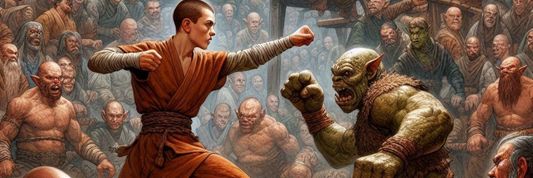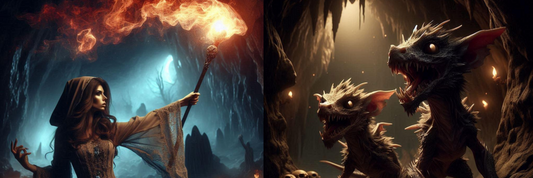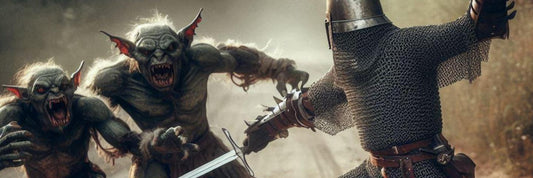Finding a Group to Play Dungeons & Dragons: Your Guide to Starting an Epic Adventure
Dungeons & Dragons (D&D) is a game that thrives on collaboration, creativity, and camaraderie. Whether you're a seasoned player or a newcomer eager to dive into the world of tabletop roleplaying, finding a group to play with is a crucial step. This guide will explore various ways to find or create a D&D group, highlight resources for new Dungeon Masters (DMs), and provide tips for setting realistic expectations.
Starting Your Journey: Where to Find a Group
Game Stores
Local game stores are excellent places to find fellow D&D enthusiasts. Many stores host regular game nights, where you can join a session or meet potential players. Check their bulletin boards, social media pages, or websites for information on upcoming events and campaigns.
- Benefits: Immediate community, potential for ongoing campaigns, access to gaming supplies.
- Tips: Don’t hesitate to introduce yourself and express your interest in joining a game. Most players are excited to welcome newcomers.
Online Forums and Platforms
The internet offers a wealth of resources for finding D&D groups. Websites and forums like Reddit, Roll20, and Discord have dedicated spaces for connecting players.
- Reddit: Subreddits like r/lfg (Looking for Group) and r/DnDNext are great places to post or respond to group advertisements.
- Roll20: This virtual tabletop platform allows you to find and join games from around the world. It’s particularly useful for those without local groups.
- Discord: Many D&D communities have Discord servers where players can chat, find games, and organize sessions.
- Benefits: Access to a large pool of players, flexibility in scheduling, options for virtual play.
- Tips: Be clear about your experience level and what you’re looking for in a game to find the best match.
Friends and Family
Don’t overlook the people you already know! Friends, family members, and coworkers might be interested in playing D&D but haven’t taken the first step. Starting a group with people you’re already comfortable with can make the game even more enjoyable.
- Benefits: Familiarity and trust, potential for regular meetups, supportive environment for learning together.
- Tips: Share your enthusiasm for the game and explain how it works. You might be surprised at who’s interested in joining!
Learning Together: New Groups and Beginners
You don’t need to join an established game to enjoy D&D. Starting a new group with fellow beginners can be a fantastic way to learn the game together. Here’s how to get started:
- D&D Starter Set: The D&D Starter Set is a perfect introduction for new players and DMs. It includes a simplified rulebook, pre-generated characters, and a prewritten adventure called “Lost Mine of Phandelver.” This adventure is designed to introduce the game’s mechanics and storytelling in a manageable way.
- Creating Your Own Adventure: If you’re feeling creative, you can design your own adventure. Keep it simple and focus on the basics: a straightforward plot, a few encounters, and opportunities for roleplaying.
Taking the Lead: Becoming a Dungeon Master
One of the most rewarding experiences in D&D is being the Dungeon Master (DM). As the DM, you guide the story, control the world, and create memorable experiences for your players. If you’re new to the role, don’t be intimidated—many resources are available to help you succeed.
Resources for New DMs
- D&D Starter Set: As mentioned, the D&D Starter Set is an excellent starting point. The prewritten adventure and simplified rules make it easier to learn the ropes.
- Dungeon Master’s Guide: This comprehensive guide offers advice, rules, and inspiration for creating and running your own adventures.
- Online Resources: Websites like the D&D official site, forums, and YouTube channels provide tutorials, tips, and community support for new DMs.
- Benefits of Being a DM: Creative control, deeper engagement with the game, the joy of seeing your players react to your story.
- Tips: Start small and gradually build your skills. Don’t be afraid to make mistakes—every DM started as a beginner.
Setting Realistic Expectations
Watching professional D&D shows like Critical Role and Dimension 20 can be inspiring, but it’s important to set realistic expectations for your own game. The players and DMs in these shows are professional actors and improvisers with years of experience. Here’s how to keep your expectations grounded:
- Focus on Fun: The primary goal of D&D is to have fun. Don’t worry about replicating the high drama or intricate plots of professional shows. Enjoy the moments of creativity and camaraderie with your group.
- Embrace Imperfection: Mistakes and hiccups are part of the learning process. Every game session is an opportunity to improve and grow.
- Celebrate Small Wins: Appreciate the little victories, whether it’s a clever solution to a problem, a well-roleplayed scene, or simply everyone having a good time.
Conclusion
Finding a group to play Dungeons & Dragons is the first step on a journey of adventure, creativity, and friendship. Whether you join a game at a local store, connect with players online, or gather friends and family around the table, the world of D&D is open to you. Remember, you don’t need to be an expert to enjoy the game—learning together and taking the brave step to become a Dungeon Master can lead to some of the most rewarding experiences in D&D.
So, gather your dice, grab the D&D Starter Set, and embark on your adventure. The world of Dungeons & Dragons awaits, and your epic story is about to begin!




